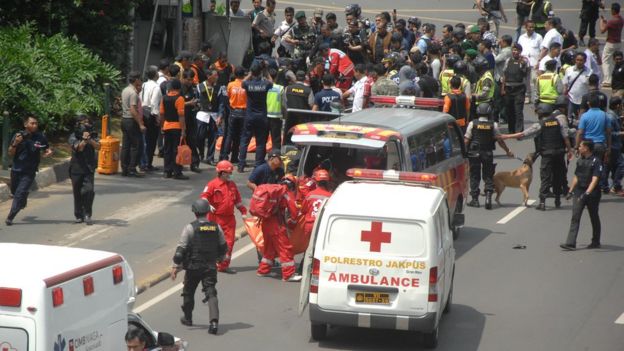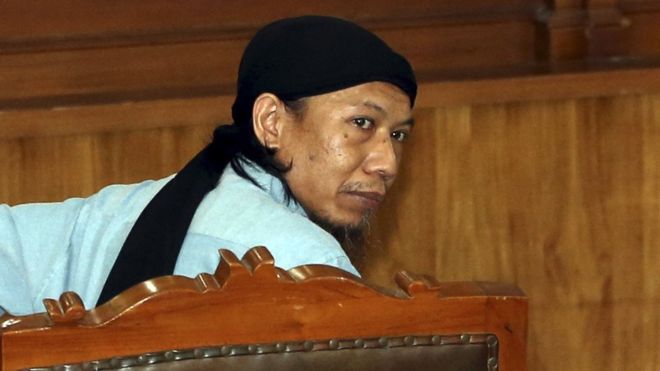Islamofascism in Indonesia
"His role was very important in spreading religious outreach online that made his followers conduct bombings."
"[Abdurrahman's] speeches, teachings and instructions have inspired his group [Jemaah Anshorut Daulah] and followers to commit criminal acts of terrorism in Indonesia."
Chief Judge Ahmad Zaini, Indonesian court, Jakarta
"This [his sentence of death] will turn him into a martyr. Much better to give him life imprisonment."
"If he had been given a long prison sentence, it's possible his ideological differences with the most extreme militants could have been used to divide the movement."
"But now that chance has been squandered."
Sidney Jones, director, Institute for Policy Analysis of Conflict in Jakarta
 |
| Islamic cleric Aman Abdurrahman is surrounded by security personnel in a courtroom after his verdict was announced in Jakarta. (Darren Whiteside/Reuters) |
Indonesia, the world's largest Muslim-majority country, is considered to be a democracy. Travel some distance from the capital Jakarta and in the provinces the kind of Islam that is practised is not moderate as Indonesia likes to think of itself, but fundamentalist, practising medieval-era Islamic principles, the religious culture given to punishment of sexual transgressions dating back to the Middle Ages and beyond, and those accused of blaspheming Islam can anticipate a death sentence from the village council of elders.
At one time, not so distant, it was the Islamist militants from Jemaah Islamiyah that constituted Indonesia's greatest public threat, as when in 2002 on the island of Bali 202 people were killed when tourists were targeted by nightclub bombings. Indonesian security forces managed to crush the al-Qaeda-linked network over a ten-year period of extermination that saw the extra-judicial killing of the JI network leaders and bomb makers, when hundreds were arrested and the group fizzled out.
Like the multiple-headed hydra of Greek legend, however, Islamofascism is a monster that cannot be slain. The vacuum created by the destruction of the al-Qaeda linked JI was replaced by jihadist groups sympathetic to the allure of Islamic State of Iraq and the Levant. Aman Abdurrahman was instrumental in forming yet another violent group of radicals driven by the primary Koranic precept of jihad. "Praise be to God", he murmured when he heard the verdict pronounced by the chief judge.
 |
| It was a scene of chaos in downtown Jakarta when gunfire and bomb explosions hit the city Getty Images |
The suicide bombings that took place this year in Surabaya, Indonesia's second most populous city which had been the result of whole families, children included involved in carrying suicide vests to create deadly mayhem spoke more than adequately of this cleric's capacity to inspire the tenets of the Islamist death cult in his followers. Even from prison serving a sentence related to terrorism, he was able to instruct his network of militants to carry out attacks in 2016 and 2017.
The court could see no possible reason for leniency to be extended to this man whose goal was to replace Indonesia's secular style of government with one in which Sharia law was paramount. Adhe Bhakti, an analyst at the Center for Radicalization and De-radicalization Studies in Jakarta spoke of the potential for Abdurrahman's death sentence to spark reprisal attacks across the country. "His words alone have been able to incite followers to carry out terrorism. The security forces must raise awareness and all intelligence services in Indonesia must co-ordinate well", he cautioned.
 |
| The Indonesia cleric is considered to be the de facto head of IS supporters in the country EPA |
0 Comments:
Post a Comment
<< Home